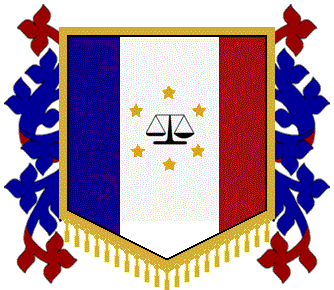
Archive of the Confederation
The Archive of the Confederation is a governmental entity managed by the constitutional officer, the Archivist of the Confederation. The current Archivist is Trenton Tyler, appointed by Chancellor William Jacob and confirmed by the Assembly in convention in 1985. The Archivist is the chief official responsible for the records and upkeep of all information of the Federal Government. The officer is also responsible for upkeeping and overseeing the records and transmission of law throughout the nation. Originally the Archivist was an officer under the Assembly, however, in accordance with the Archive Act of 1870, the Archive was established as a separate administration under the Department of State.
The Archives themselves are located next to the Capitol Meetinghouse in Concord. It is a large storage building containing vast arrays of computers and paper articles open to the general public. It is open seven days a week, 9am to 5pm. The building contains a large rotunda that houses the Constitution, the Deens Act, and other important documents to Aurensia. Inside the actual building itself is vast network of records and documents that are otherwise applicable to governance. There is one secured area in the Archive for currently classified materials.
The Archives themselves are located next to the Capitol Meetinghouse in Concord. It is a large storage building containing vast arrays of computers and paper articles open to the general public. It is open seven days a week, 9am to 5pm. The building contains a large rotunda that houses the Constitution, the Deens Act, and other important documents to Aurensia. Inside the actual building itself is vast network of records and documents that are otherwise applicable to governance. There is one secured area in the Archive for currently classified materials.
Contents
- The Deens Act - The Deens Act made the current Confederation possible. Although the document is a single page, it set the stage for the largest political transformation of Aurensia since the first Charter. After the victory of the Freemen, the very first act of the Provisional Assembly (the post-war transitional legislature) was the Deens Act. Officially titled, The Act for the Establishment of Free and Just Government, it became colloquially referred to as the "Deens Act" because it was within a pub in Benton, Freemont called "Deens Den" that the Provisional Assembly had passed it. The Deens Act set the fundamental foundations of the new Aurensian government as well as revoked the old one. Under the Deens Act, the Commonwealths governed themselves relatively independently, only meeting to discuss the new Constitution.
- The Constitution - By far the single most important legal document in Aurensian history, the current Constitution was conceived at the Meeting at Exeter. The series of conventions lasted nearly two years and were the brainchild of a variety of Criticalist and classical liberal thinkers of the time. William Dickson, one of the premier founding fathers of the new nation was instrumental in presiding and achieving success at the conventions. The Constitution was completed in early 1869, and finished with its final modifications and ratification in 1870. The Constitution has been amended several times since its original writing. Although not a separate document, the discussion of the Constitution would be incomplete without including discussion of the Rights of Man. The Rights of Man is contained at the immediate end of the document and describes the various fundamental liberties of the citizens of Aurensia. It is the most studied and widely circulated part of the Constitution.
- Rights of Man - As previously stated, the Rights of Man are not technically a separate document from the Constitution. They are attached directly to the end of the document. They are however, separated for the purpose of indicating their importance not only to Aurensian jurisprudence but also to the discussion of Aurensian history. No other single piece of legislation has been cited as often as this particular part of the Constitution. While the main body of the Constitution describes the function of government, the Rights of Man limit and describe the purpose of Government.
- Provision of Reason - The Provision of Reason was an act passed during a relatively routine legislative session in 1907 by the Committee on Law and its Intents. When the motion came to the floor however, the fundamental nature of the law became apparent as a manifestation of the ongoing Criticalist ideological development. It passed both houses of the Assembly almost unanimously. Today, the Provision of Reason is a mandatory consideration for all laws passed by the legislature. It too, is a relatively simplistic document on the surface. It demands the acquiescence of the legislature to "submit to reason" a textbook example of Criticalist metaphysical and epistemological premise common even today.
- Doctrine for International Relationships
- Summary of Landmark Superior Court Decisions
- Excerpts from Important Literature

